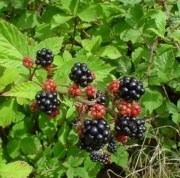Difference between revisions of "Blackberry"
Jump to navigation
Jump to search
(username removed) |
|||
| (2 intermediate revisions by 2 users not shown) | |||
| Line 2: | Line 2: | ||
== Description == | == Description == | ||
| − | Any bramble plant of the ''Rubus'' genus (most commonly ''Rubus fruticosus'') that bears small, purplish, edible berries. The leaves and young shoots of the blackberry bush produce a dark brown or black dye that is rich in tannins. The roots give orange and greenish tones. The blackberry fruit, when ripe, makes red (no mordant), green (chromium mordant) or purple (aluminum or tin mordants) dyes. The addition of vinegar to the dye bath strengthens the purple tones. The primary colorants in the berries are [ | + | Any bramble plant of the ''Rubus'' genus (most commonly ''Rubus fruticosus'') that bears small, purplish, edible berries. The leaves and young shoots of the blackberry bush produce a dark brown or black dye that is rich in tannins. The roots give orange and greenish tones. The blackberry fruit, when ripe, makes red (no mordant), green (chromium mordant) or purple (aluminum or tin mordants) dyes. The addition of vinegar to the dye bath strengthens the purple tones. The primary colorants in the berries are [[anthocyanin|anthocyanins]], such as cyanidin, malvidin, and chrysanthemin. |
== Synonyms and Related Terms == | == Synonyms and Related Terms == | ||
| Line 8: | Line 8: | ||
''Rubus fruticosus'' (common blackberry); mûre (Fr.); mora selvatica (It.); amora silvestre (Port.); bramble; blackberries (pl.) | ''Rubus fruticosus'' (common blackberry); mûre (Fr.); mora selvatica (It.); amora silvestre (Port.); bramble; blackberries (pl.) | ||
| − | == | + | ==Resources and Citations== |
* R.J. Adrosko, ''Natural Dyes in the United States'', Smithsonian Institution Press, Washington, DC, 1968 | * R.J. Adrosko, ''Natural Dyes in the United States'', Smithsonian Institution Press, Washington, DC, 1968 | ||
| Line 18: | Line 18: | ||
* ''The American Heritage Dictionary'' or ''Encarta'', via Microsoft Bookshelf 98, Microsoft Corp., 1998 | * ''The American Heritage Dictionary'' or ''Encarta'', via Microsoft Bookshelf 98, Microsoft Corp., 1998 | ||
| − | * ''Encyclopedia Britannica'', http://www.britannica.com Comment: "Blackberry." | + | * ''Encyclopedia Britannica'', http://www.britannica.com Comment: "Blackberry." Accessed 13 May 2004 . |
| − | * Wikipedia | + | * Wikipedia at http://www.wikipedia.com Comment: Blackberry |
[[Category:Materials database]] | [[Category:Materials database]] | ||
Latest revision as of 14:35, 8 May 2022
Description
Any bramble plant of the Rubus genus (most commonly Rubus fruticosus) that bears small, purplish, edible berries. The leaves and young shoots of the blackberry bush produce a dark brown or black dye that is rich in tannins. The roots give orange and greenish tones. The blackberry fruit, when ripe, makes red (no mordant), green (chromium mordant) or purple (aluminum or tin mordants) dyes. The addition of vinegar to the dye bath strengthens the purple tones. The primary colorants in the berries are anthocyanins, such as cyanidin, malvidin, and chrysanthemin.
Synonyms and Related Terms
Rubus fruticosus (common blackberry); mûre (Fr.); mora selvatica (It.); amora silvestre (Port.); bramble; blackberries (pl.)
Resources and Citations
- R.J. Adrosko, Natural Dyes in the United States, Smithsonian Institution Press, Washington, DC, 1968
- John and Margaret Cannon, Dye Plants and Dyeing, Herbert Press, London, 1994
- Random House, Webster's Encyclopedic Unabridged Dictionary of the English Language, Grammercy Book, New York, 1997
- The American Heritage Dictionary or Encarta, via Microsoft Bookshelf 98, Microsoft Corp., 1998
- Encyclopedia Britannica, http://www.britannica.com Comment: "Blackberry." Accessed 13 May 2004 .
- Wikipedia at http://www.wikipedia.com Comment: Blackberry
